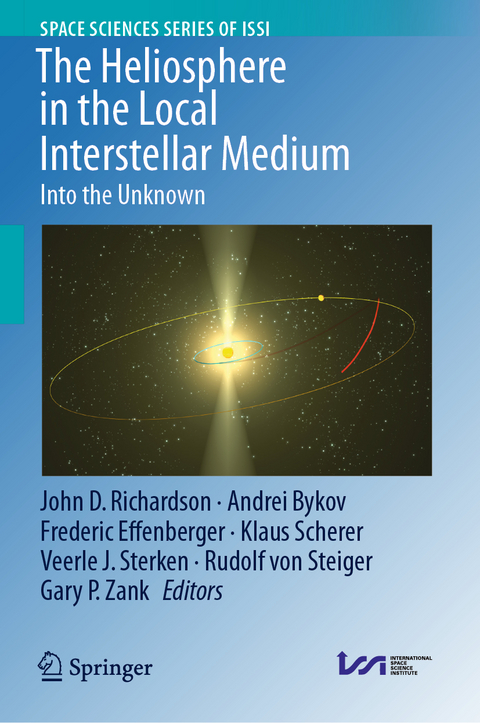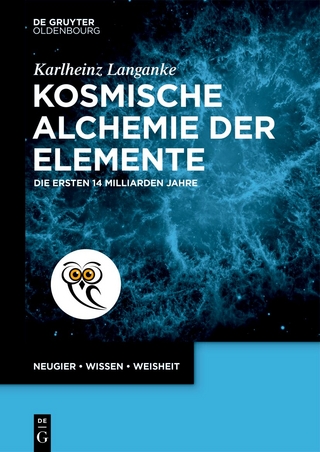
The Heliosphere in the Local Interstellar Medium
Springer (Verlag)
978-94-024-2228-3 (ISBN)
This book is a collection reviews from experts in the many aspects of this field that describe the current state of knowledge of the heliosphere's interaction with the interstellar medium, puzzles yet to be solved, and future plans to continue these studies.
John D. Richardson Dr. John D. Richardson specializes in heliophysics and planetary magnetospheres. He is PI of the Voyager plasma experiment, which made the first observations of the plasma at the termination shock, in the heliosheath, at the heliopause, and in the local interstellar medium. He is a co-I on the Parker solar probe SWEAPS experiment and on IMAP and has published over 300 papers on space physics topics. Andrei Bykov Andrei Bykov is chief researcher in high energy astrophysics at the Ioffe Institute, corresponding member of the Russian Academy of Sciences. His principal research interest are theory and observations of processes in astrophysical objects with extreme energy release ‐ supernovae, gamma‐ray bursts and clusters of galaxies. He is author and coauthor of over 270 scientific publications, a book, Turbulence, Current Sheets and Shocks in Cosmic Plasmas, and editor of seven books on high energyastrophysics. Frederic Effenberger Dr. Effenberger is an expert on energetic particle acceleration and transport in space plasmas and other astrophysical systems. He works both on the fluid and kinetic theory of plasmas and is particularly interested in the interaction of turbulent magnetic fields and cosmic ray particles. Klaus Scherer Dr. Scherer is an expert in modeling astrospheres. He is also interested in kinetic theory. Veerle Jasmin Sterken Veerle Sterken is a researcher at the ETH Zürich in Switzerland, currently focusing on the dynamics and interaction of interstellar dust with the heliosphere. She is the PI of an ERC Starting Grant N° 851544 ASTRODUST. Sterken’s research interests include the dynamics and simulations of interstellar and interplanetary dust, calibration of spacecraft dust detectors, data analysis, and mission concept design. Sterken is the recipient of an Amelia Earhart Award in 2007 and of the Belgian Christophe Plantin prize in 2021. Rudolf von Steiger Rudolf von Steiger holds a diploma (MS) in theoretical physics (1984), a doctorate (PhD) in experimental physics (1988), and a habilitation in extraterrestrial physics (1995), all from the University of Bern. He was a co-investigator of the Solar Wind Ion Composition Experiment (SWICS) on Ulysses and an associated scientist of the AMPTE and ACE missions. His relevant experience includes theoretical modelling of solar chromospheric processes, specifically of the FIP fractionation effect, as well as the analysis and interpretation of solar wind observations both in the Earth's magnetosheath and in interplanetary space. His research objectives encompass the origin of solar wind; chromospheric and coronal processes; solar wind elemental and charge state composition, kinetic properties, and evolution. Between 1988 and 1995 he was a Research Associate at the University of Bern with an intervening year at the University of Maryland in 1990. In 1995 he joined the newly created International Space Science Institute (ISSI) in Bern as a senior scientist. From 1999 to 2021 he was is working as a director at the ISSI and also held an associate professorship at the University of Bern. He has received an early career award from the Swiss National Science Foundation and holds several achievement awards from both NASA and ESA; he has served in many evaluation or expert committees for ESA, NASA, the European Commission, and the Swiss NSF. He chaired Commission D of COSPAR in 2004-2012 and served as an editor for Space Science Reviews, Frontiers in Space Physics, and Living Reviews in Solar Physics. Gary P. Zank Gary Zank is the director of the Center for Space Plasma and Aeronomic Research (CSPAR), University of Alabama Board of Trustees Trustee Professor, Aerojet/Rocketdyne Chair in Space Science, an Eminent Scholar and Distinguished Professor, and chair of the Department of Space Science at the University of Alabama in Huntsville. Zank’s research interests extend across space physics, plasma astrophysics, plasma physics, and the interaction of the solar wind with the partially ionized interstellar medium. Zank was named the University of Alabama Board of Trustees Trustee Professor, the first and only University of Alabama System faculty member to achieve this position. Zank is a recipient of the Axford Medal, the highest honor given by the Asia Oceania Geosciences Society (AOGS). Zank is a member of the US National Academy of Sciences and a fellow of the American Geophysical Union, the American Physical Society, and the American Association for the Advancement of Science. Zank is also an AOGS honorary member and was chosen by the International Space Science Institute as a Johannes Geiss Fellow. Zank has been the chair or member of many National Academies committees. Zank received a Ph.D in applied mathematics from the University of Natal in South Africa.
lt;p>1. Editorial, The Heliosphere in the Local Interstellar Medium: Into the Unknown (Richardson et al.).- 2. The Early History of Heliospheric Science and the Spacecraft That Made It Possible (Zank et al).- 3. Observations of the Outer Heliosphere, Heliosheath, and Interstellar Medium (Richardson et al).- 4. The Structure of the Large-Scale Heliosphere as Seen by Current Models (Kleimann et al ).- 5 Shocks in the Very Local Interstellar Medium (Mostafavi et al).- 6 Backscattered Solar Lyman- Emission as a Tool for the Heliospheric Boundary Exploration (Baliukin et al).- 7 Turbulence in the Outer Heliosphere (Fraternale et al ).- 8 Recent Developments in Particle Acceleration at Shocks: Theory and Observations (Perri et al).- 9. Interstellar Neutrals, Pickup Ions, and Energetic Neutral Atoms Throughout the Heliosphere: Present Theory and Modeling Overview (Sokól et al).- 10. In Situ Observations of Interstellar Pickup Ions from 1 au to the Outer Heliosphere (Zirnstein et al).- 11. The Heliosphere and Local Interstellar Medium from Neutral Atom Observations at Energies Below 10 keV (Galli et al).- 12 The Structure of the Global Heliosphere as Seen by In-Situ Ions from the Voyagers and Remotely Sensed ENAs from Cassini (Dialynas et al).- 13 Galactic Cosmic Rays Throughout the Heliosphere and in the Very Local Interstellar Medium (Rankin et al).- 14 Anomalous Cosmic Rays and Heliospheric Energetic Particles (Giacalone et al).- 15. Theory of Cosmic Ray Transport in the Heliosphere (Engelbrecht et al).- 16. Astrospheres of Planet-Hosting Cool Stars and Beyond When Modeling Meets Observations (Herbst et al).- 17 Dust in and Around the Heliosphere and Astrospheres (Sterken et al).- 18. Inhomogeneity in the Local ISM and Its Relation to the Heliosphere (Linsky et al.).- 19 Future Exploration of the Outer Heliosphere and Very Local Interstellar Medium by Interstellar Probe (Brandt et al).
| Erscheinungsdatum | 16.12.2023 |
|---|---|
| Reihe/Serie | Space Sciences Series of ISSI |
| Zusatzinfo | 272 Illustrations, color; 72 Illustrations, black and white; VII, 847 p. 344 illus., 272 illus. in color. With Spin-off from the Topical Collection "The Heliosphere in the Local Interstellar Medium: Into the Unknown" of the journal Space Science Reviews, Volume 88, 2023. |
| Verlagsort | Dordrecht |
| Sprache | englisch |
| Maße | 155 x 235 mm |
| Themenwelt | Naturwissenschaften ► Physik / Astronomie ► Astronomie / Astrophysik |
| Schlagworte | Interstellar probe • Interstellar Voyages and Solar Observation • Physics of the Heliosphere • Solar Physics and Energetic Neutral Atoms • Solar Wind and Stellar Physics |
| ISBN-10 | 94-024-2228-5 / 9402422285 |
| ISBN-13 | 978-94-024-2228-3 / 9789402422283 |
| Zustand | Neuware |
| Informationen gemäß Produktsicherheitsverordnung (GPSR) | |
| Haben Sie eine Frage zum Produkt? |
aus dem Bereich


